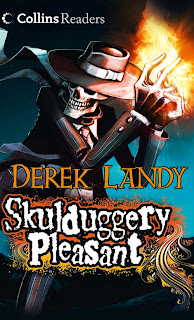Compelling characterisation
The exciting action in Skulduggery Pleasant is played out by well defined and, at times, mysterious characters as written by author Derek Landy.
In particular, the two main characters, the skeleton detective, Skulduggery Pleasant, and young Stephanie Edgley, break stereotypical moulds as they defy our existing expectations of 12-year-old schoolgirls and of skeletons.
Landy also creates a suitably dark villain to challenge the duo. Nefarian Serpine, filled with cold malevolence, claims he is a man of peace, yet he will stop at nothing to learn other people’s secrets.
Even away from the magical underworld, in suburban Dublin, malice overflows and confronts Stephanie during encounters with her jealous and vindictive relatives, Fergus, Beryl and their twin daughters, Carol and Crystal. The conflicts and challenges abound for our two heroes.
Encouraging detailed and inferential reading of the novel
Skulduggery’s Pleasant’s comment, ‘Looks are more often than not deceiving … surface is nothing’, is a great starting point for considering the ways in which Landy explores the themes of magic and betrayal in the book.
The novel provides substantial evidence to underline how fatal it is to make judgements based on first observations. Students could be encouraged to keep an individual record of such findings in the novel, and then produce interesting and varied display material revealing how things are not always what they seem in Skulduggery Pleasant.
A starting point for the activity might well be a consideration of the front cover and the impression it makes:
What do students expect from this dark, skeletal creature? Is he good or bad? What do the suave and snazzy clothes suggest? Does he look like jokester? Is he a hero or a villain?
Studying the writing
The quality of the author’s writing is an essential consideration when selecting a class reader. If you open Year 7 with Skulduggery Pleasant, a good model for students’ own writing could stem from foregrounding Landy’s development of tension.
His presentation of emotional friction, arousal of fear, varying chapter endings to maximise suspense is well worth exploration: some scenes end at moments of high drama and some with no more than a wry observation or pithy phrase.
I would also recommend a focus on Landy’s use of wordplay via understatements and hyperbole that add excitement and fun to the teasing and taunting of the conversational banter between the two lead characters.
The universal themes in this novel have a distinct appeal in study as well:
- relationships
- loss
- identity
- betrayal
- death.

Gaining insight through referencing other texts
Given the fact that fantasy novels are devoured and enjoyed by young teenagers, Skulduggery Pleasant is a class reader that certainly offers a great opportunity for fruitful interaction with similar texts. Incorporating an intertextual activity seems essential to the exploration of this novel. To seriously enhance the reading, I would urge students to reflect on similarities and contrasts between the class reader and other works in this field with a view to opening discussion on one or more of the following:
- the conventions of fantasy narrative
- creation of the extraordinary
- female roles in fantasy
- presentation of good and evil
- misjudged characters
- predictability and surprise in the genre
Download the free Scheme of Work for Skulduggery Pleasant, which includes a classroom activity exploring Landy’s building of tension in the novel, including a look at ‘Appearance vs Reality’.
See also the new free PowerPoint Teacher Lesson for downloading, in which students write their own free verse poem telling a tale of life with a superpower.
Jan Jarrett grew up in the West Midlands. After accompanying her husband Stephen on a two year business contract to East Africa, Jan devoted a number of years to family life and four young children. The family then moved from Birmingham to Norfolk where Jan seriously began her professional career. Over a period of 30 years she has worked as an English teacher, a Head of English, English Adviser, Teenage fiction reviewer and Freelance Consultant. She claims her main focus throughout has always been and will always be generating good practical ideas for the classroom.


